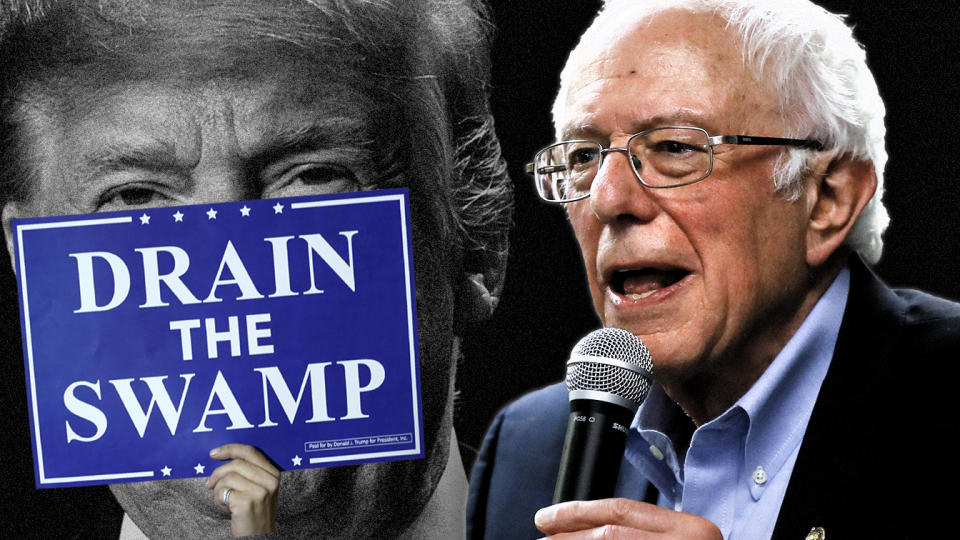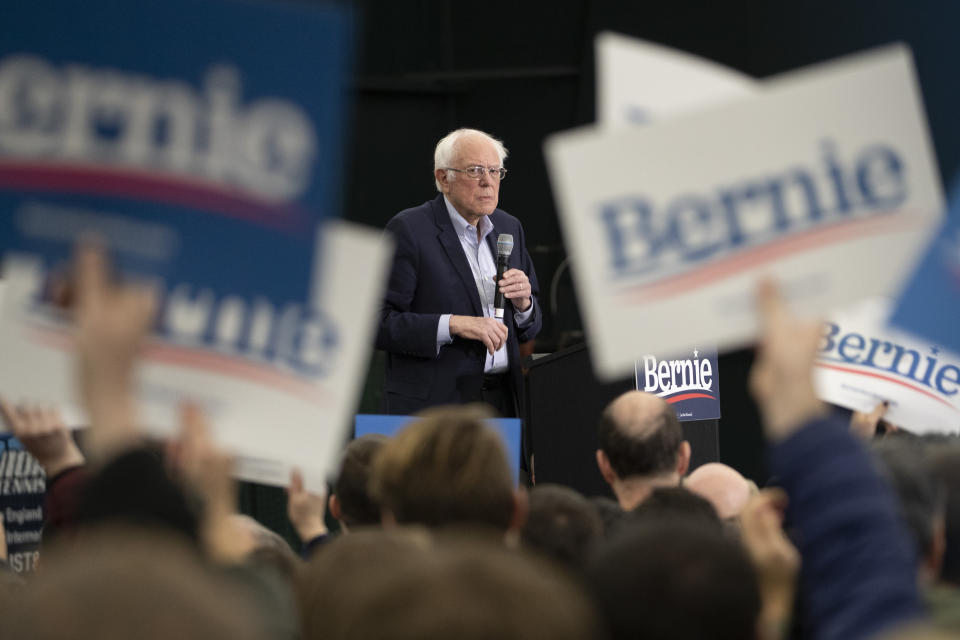Bernie Sanders thinks he can strip the antiestablishment mantle from Trump
- Oops!Something went wrong.Please try again later.
- Oops!Something went wrong.Please try again later.
- Oops!Something went wrong.Please try again later.
Bernie Sanders’s refusal to join the Democratic Party for most of his career has given him outsider credibility with many voters. Yet, after 30 years in Congress, he is in some ways very much part of the political establishment.
President Trump, who won the presidency in 2016 on the strength of an outsider message, will no doubt cite this very fact if Sanders becomes the Democratic nominee.
The Vermont senator, however, would severely test the president’s claim to the outsider label, according to Sanders’s campaign manager, Faiz Shakir.

Trump’s first presidential campaign “was a bastardized version of antiestablishment rhetoric,” Shakir said in an interview with Yahoo News. “And going up against Hillary Clinton, it was successful. The question now is, can we, as the Democratic Party, put up somebody who challenges that on its head, successfully?”
Shakir said Democrats should be ashamed that Trump has brought middle-class working people into the Republican Party tent, while the Democrats’ base is increasingly composed of the upper-income and highly educated.
“That’s pretty embarrassing,” Shakir said. “That’s a dynamic you absolutely have to flip.”
What makes Sanders uniquely antiestablishment is that he wants to disentangle the financial establishment from the political establishment.
Shakir said that understanding this distinction — between financial insiders and political insiders — is key to Sanders’s case that he is the true outsider. Trump, he argues, is a “fake Bernie Sanders” who kowtows to big business.

The whole point of Sanders’s candidacy, in fact, is the argument that the political establishment has been co-opted by the financial establishment. The Democratic Party used to be more independent of big business and needs to be once again, he believes.
Sanders says he wants to reorient the Democratic Party to prioritize the poor and working class, taking it back to its roots in the New Deal and Franklin Delano Roosevelt.
The Democratic Party has drifted from that focus — in the minds of anti-poverty crusaders like Sanders — since the mid-’80s, when it started taking donations from corporations and Wall Street. Clintonism, in the minds of modern progressives, stands for the moment when political pragmatism and the need to keep up with Republicans in the arms race for political donations led them away from first principles.
The Republican Party in the modern era has been very comfortable with courting the corporate business and financial sectors, and its core ideology since Ronald Reagan has preached the virtue of tax cuts and trickle-down economics.
But Shakir said Trump has done very little to confront the influence of wealthy interests in American politics.
“[Trump] said, ‘OK, I'm going to go drain the swamp. I’m going to take out Goldman Sachs. I’ll take on the pharmaceutical companies,’” Shakir said.
Trump, in other words, promised to reform an economic and political system that many poor and working-class people see as rigged against them and in favor of the wealthy. But then he signed a tax bill that benefited corporations and the wealthy. He has also so far failed to support prescription drug reform already passed by House Democrats. Senate Majority Leader Mitch McConnell has declined to bring the bill, which is opposed by Big Pharma, to the floor.
During the 2016 campaign, Trump followed a long-established populist playbook by running against the establishment. And he won the presidency by promising voters to drain the swamp of all the self-dealers stealing money out of taxpayers’ pockets.
Sanders also targets those who feel taken advantage of but, in contrast to Trump, promises a political revolution to take on the rich, the “1 percent” and the “billionaire class.”
It is an instructive contrast. Trump’s message reflects how conservatives see the establishment as big government and those who make money off it. Sanders shows that progressives see big business, such as banking, pharmaceuticals and Wall Street, as the establishment.

This distinction is crucial to understanding the debate that could unfold between Trump, the incumbent president, and Sanders, if he becomes the nominee.
Shakir said Sanders’s refusal to take corporate money is key to electing a president who will not be deterred by big-money influence from rebalancing the economy more in the direction of the poor and working class.
“The only way to defeat fake Bernie Sanders is with real Bernie Sanders. That is how I’ve felt about this entire campaign, right? It’s like, if you want to campaign on draining the swamp, let’s put somebody up there who actually will and has fought the establishment to drain the swamp. So let’s have that debate,” Shakir said.
Of course, Trump and the Republican Party will tell Americans to be terrified of the economic impact of Sanders’s proposals: He wants to replace all private health insurance with a government-run program, cancel all student debt and levy a number of taxes on the wealthy and corporate interests.
And the president and his party will generously apply the term “socialist” to Sanders, since Sanders himself self-identifies as a democratic socialist, has traveled to the former Soviet Union and has associated in the past with the Socialist Workers Party.
Trump, in his State of the Union address Tuesday night, referred to Democrats as proposing a “socialist takeover of our health care system.”
“We will never let socialism destroy American health care,” Trump said.
Shakir acknowledged that the country may not be ready to embrace Sanders’s call to upend the existing system at a time when the economy is strong and the stock market keeps rising.
“We’re going to find out a lot about ourselves, right?” Shakir said. “Maybe we find out people are ready. They’re hungry for this. They’re eager for it.”
On the other hand, he said, “maybe they’re not. Maybe they’re just not interested. I don’t want to prejudge it, basically.”

_____
Read more from Yahoo News:




